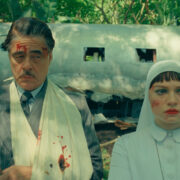Horrific Inquiry: PROM NIGHT (2008)
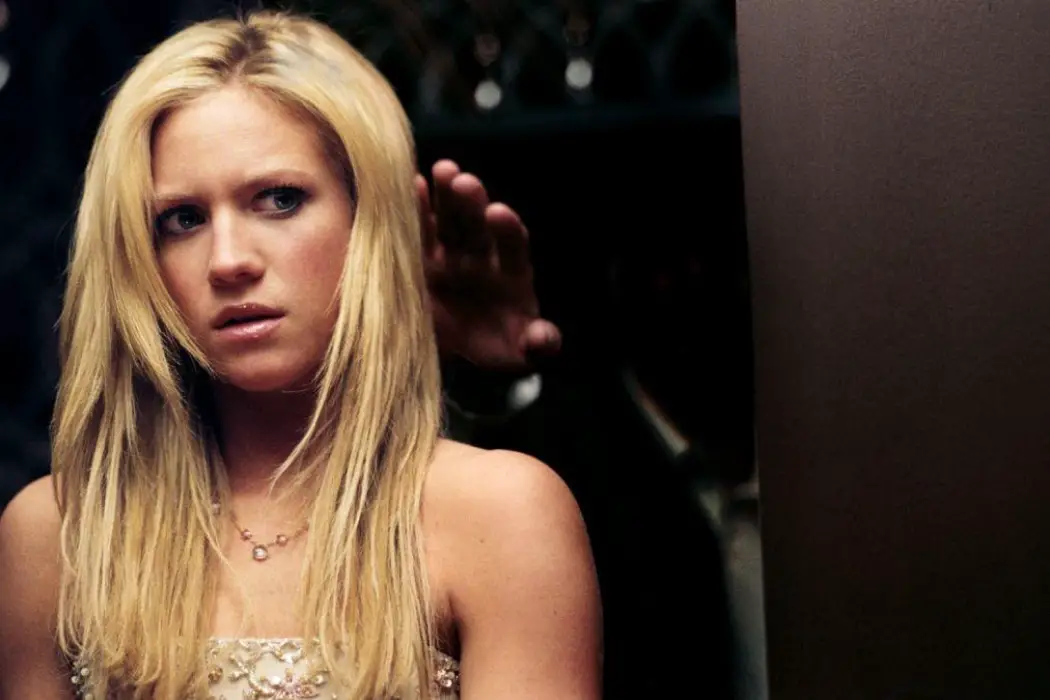
Stephanie Archer is 39 year old film fanatic living in…
Welcome back to the scariest, and at times goriest, column here at Film Inquiry: Horrific Inquiry. Twice a month, I will be tackling all things horror, bringing two films back into the spotlight to terrify and frighten once more. And occasionally looking at those that could have pushed the envelope further. Join us as we dive deep into the heart of horror, but warning, there will be spoilers.
“Where is she? She belongs to me” – Prom Night (2008)
It’s supposed to be a night to remember. The finality of high school on the horizon is marked by lasting moments with family and friends that speak to the closure of childhood – hopes and dreams turning to the future. For many, this period of transition has spoken to volumes of narratives that have been brought to life before our eyes, some wholly relatable, while others are eye-opening. For horror fans, this period of transition lends itself the opportunity to embrace the darker elements of change. With Nelson McCormick’s Prom Night, this annual “night to remember” takes on a new meaning, transitions coming full stock in the wake of horror and gore.
While this is a remake of the Paul Lunch’s 1980s classic of the same name, this remake yearned for a rewatch. For a night to remember, Prom Night seemed less memorable than I am sure the filmmakers had intended, and with over a decade passed since its release, it was time to return to Bridgeport High.
A Transitional Opening
Prom Night boasts a deeply successful opening sequence and initial setup. There is an allure of mystery as Donna (Brittany Snow, Pitch Perfect) is dropped off at the house by her friend Lisa (Dana Davis, 10 Things I Hate About You) and Lisa’s mother. As she and Lisa speak of defeating Crissy Lynn (Brianna Davis) for one of the last remaining cheerleading spots, Donna’s hesitancy, one supported by her parents, speaks to a recent trauma living just below the surface. As Lisa and her mother acknowledge with understanding, the audience is left in the dark to what may have shaped her refusal to engage in the activities she seemingly had already made plans for.
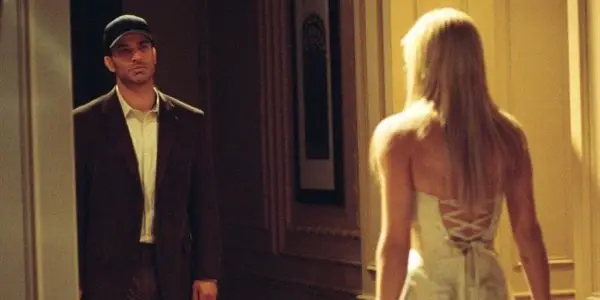
Yet, as much as there is a hidden trauma reflected in this short interaction, it feels resolved just the same. There is the feeling that Donna and her family are working through it, transitioning from pain to healing – with the support of those closest to them. As Donna heads back into the house, Snow radiates an aura of innocence, one that shines even brighter as she enters her home, the lights dimmed to an ominous depth. In an instant, we know something is not right, even though it takes her a moment to find that ourselves. As the camera takes in the compounding silence of the home, the camera begins to pan away from Donna, slowly revealing to the audience her murdered father behind the couch.
In an instant, the film has transitioned the audience from the dark to the foreground of knowledge. We do not know what haunts Donna, or what trauma has come to pass, but we know what trauma she is about to endure. This flip of knowledge heightens the tension that builds quickly throughout the opening, Donna discovering the body of her brother further confirming the understanding that her entire family may be dead. As screaming cuts through the silence like a knife, Prom Night delivers early on the brutality it is seemingly willing to embrace. While the murder of her mother before her eyes does not embrace the gore, it welcomes the violence and the shock.
Building up the Night
As the opening proves to be a blending of both reality and fiction, audiences are taken 3 years into the future, Donna relaying the return of her dreams of that night to Dr. Crowe (Ming-Noa Wen, ER). There is the feeling of A Nightmare on Elm Street as Dr. Crowe assures her that the only place Richard Fenton can hurt her is in her dreams. It is a fleeting feeling as the film moves along, transitioning to a potential case of psychology and the effects of trauma. Had the film leaned more into this idea, it may have had more success, but we will get to that in a moment.
Dr. Crowe further speaks to Donna regarding the potential for psychological trauma to become heightened during a period of transition – here being the ending of high school. This uncertainty regarding Donna is further informed as she is with Lisa and Claire (Jessica Stroup, The Hills Have Eyes 2) preparing for the prom and she thinks she sees Richard Fenton standing at the bus stop starring at her. In an instant, his image vanishes. The question of how deep her psychological trauma is and the effects of transition might take begin to bubble to the surface. And as we learn that Donna stopped taking her medication a week ago so as not to feel numb from the night’s events, it seems as though McCormick has crafted the perfect set-up for unpredictability.
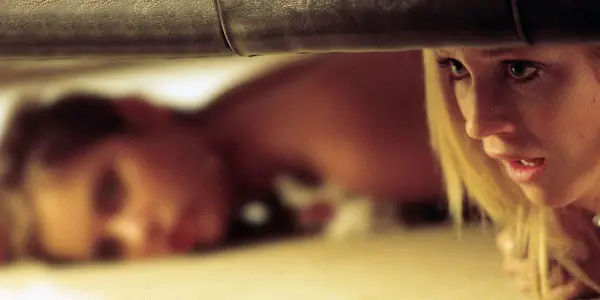
As the psychology of Donna is being established, so is the environment on the night of prom. Prom Night hits every cliche one would expect for a night to remember. Building the euphoria that typically surrounds prom, side-by-side couple photos are taken, limos are ordered, talk of sex is insinuated and classic over-the-top movie prom events come to life. But the euphoria of the night is not only rooted in the cliches depicted but in the relationships between the six friends. There is tightness within the group, no one, other than Donna, stands out above the others, breaking down a common horror genre cliche. Further building on this breakdown, there is not immediately an asshole of the group – though one emerges, kinda, later on. There is definitely candidness, but the level you would expect of high school students.
The atmosphere generated early on gives the film a solid foundation to work off, both in the mind of Donna and in the environment and interactions of the night. Unfortunately, the film is about to have a transition all its own.
Changing Direction
Prom Night has faint scents of horror films of the past. Where feelings of A Nightmare on Elm Street make their way in, so too does Halloween. As the teens enter the prom, audiences are brought to the local precinct to discover that Richard Fenton has actually escaped the mental institution he has been residing in. As the three-day late memo reaches the desk of Detective Winn (Iris Elba, Beast of No Nation) and Detective Nash (James Rensone, Sinister), the film falls into a pitfall of exposition. While an explanation is necessary to fill the audience in on the still mysterious trauma that plagued Donna at the very beginning of the film, it feels fed to the audience rather than interlaced.
As Winn and Nash leave to alert Donna, Winn tells Nash of the case – of the high school teacher who became obsessed with Donna, his obsession escalating to the murders of her family. Each detail is reiterated as they make their way to prom, breaking audiences from the atmosphere it has worked so hard to create – and it doesn’t stop there.
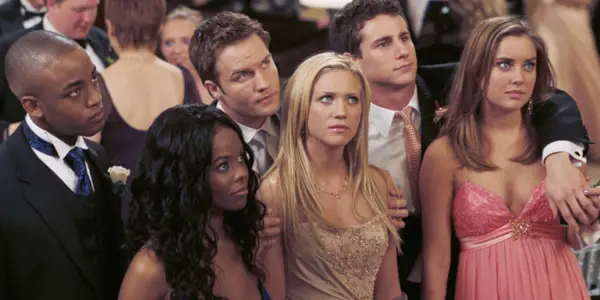
As Donna and her friends work their way through the hotel, settling into the event and their rooms, the psychology of Donna is thrown to the side, audiences watching as not only does Fenton check into the hotel, but zero in on his victim. From this moment, Prom Night leaches much of its mystery out, draining the suspense and leaning exclusively into becoming a slasher. Because you know the killer is real, has escaped, and is definitely there, we as audiences are now just waiting for when and who he will strike first.
Slow build-up to an intense endgame
Prom Night stalls at this point, each victim sectioned off from the rest, alone and defenseless – predictably. There are few surprises hidden throughout Prom Night or its narrative, the film falling into a predetermined formula of horror. Too often, the group of friends is left talking about the future, watching slide shows, and enjoying various elements of the night. So much so, scenes feel more like filler between the kills, leaving audiences to question if it was wise to set almost the entity of the film within the prom itself.
Though all is not lost as the film’s lackluster middle sets up for a more impressive finish. While it abandons much of what is built in the beginning, it saves it in the end. The psychology of Donna does not return, but the darkened intensity of its opening does. As the fire alarm of the hotel is clearing everyone out, Donna returns to her room to retrieve the shawl that was once her mother’s. Here, she finally comes face to face with Fenton, an epic two-room attempt to escape and eventual mirroring of the beginning of the film ensues. And while the film itself has been fairly predictable until now, Prom Night has a few surprises to close out with.
One of the biggest is the idea of a second location for its finish. As Scream 4’s gang of teenagers would discuss, the remake does not end at the party but at the after-party. And while Prom Night does not have an after-party per se, the violence does not end at the hotel, but rather where it all began – Donna’s home. It is a clever wrap-around that successfully breaks the horror ending expectation, but in exchange gives the film more filler that could have had a deeper and more resounding impact.
The Misogyny of the Night
Prom Night wants to both examine misogyny and masculinity within its men and the interactions they each go through. There is almost a feeling of generational masculinity that takes form within its core. Richard Fenton is most obviously the toxic male of the film. His idea is that Donna “belongs” to him. She is a possession to be wielded and claimed. His persona and mentality too often are seen through horror films – and life. But it is not just Fenton that speaks to traditional masculinity.
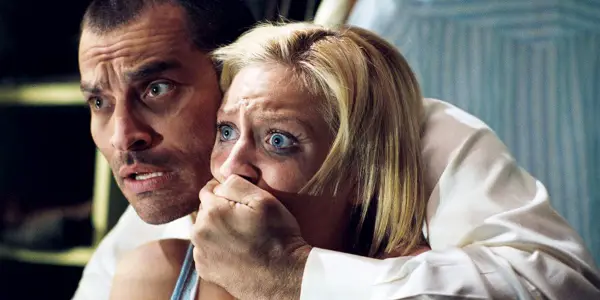
Detective Winn has his own element in the conversation. While he is the guiding light for the audience, filling in the gaps in the story and dedicating himself to protecting Donna, it is his final moments that speak the loudest. As the final confrontation between Donna and Felton unfolds, Prom Night leans away from the classic conclusion of the final girl rising above her tormentor, and surviving by her own actions. Here, however, Donna saves herself in that she gets herself away from Fenton, but it is Winn who becomes the “knight in shining armor”. Without him, Donna would have never escaped or survived. While it is vitally important to understand that it is not Winn saving her that speaks to the masculine framework, but rather that she needed him to.
For much of the film, there is this unspoken competition, a need to find the killer that got away that radiates from Winn. While on the surface, it is about protecting Donna, there is a depth to Winn that speaks to the need to beat Fenton – to bring finality to the win. As he shoots Fenton in the final moments, he is saving Donna, but he is also satisfying and putting to bed this deeply rooted need to win. As he takes Donna in his arms to comfort her, it feels short and shallow, the abrupt ending to the film giving little care to Donna’s trauma, the evening, or even her future. In the end, it’s about Winn saving the day and overcoming the killer who got away. In the end, Donna is forgotten.
Yet, this generational view of masculinity changes as we look at the young men at the prom. Too often in horror films, there is a group of teens that are assholes, toting the mark of death on each of them. Here, the only friend in contention is Michael. Yet, even Michael (Kelly Blatz), is far from the worst depiction in horror history. He is the asshole, lacking understanding and empathy for his girlfriend. Yet, Prom Night is not content with letting him be the stereotypical horror trope of teenage male toxicity. The film is careful to construct Michael as scared, rather than a straight-up jerk. The fights he starts with his girlfriend, and the lack of consideration of her feelings, as by-products of an inability to express emotion. He is afraid of losing her and of the impending transition into adulthood. And Prom Night holds him accountable. As he returns to the hotel room to speak with Claire, she assumed refusal to leave the bathroom gives a glimpse into Michael’s dedication and need to make it right. While he may not be the best in the group, Michael proves there is more to him than the horror stereotypes too often encompassed.
As the night plays on, Bobby (Scott Porter) refuses to let Donna give up her scholarship and a chance at Brown University. He encourages her to reach for her dreams and not to be held back by him, the strains it will be put on their relationship, or the fear that she has worked through. He is grounded, supportive and unrelenting in love. Ronnie (Collins Pennie), Lisa’s boyfriend, has his own small arch that while initially seems to speak to wanting to only have sex with Lisa, runs deeper, a potential proposal and eyes only for her driving not only his contrast to the older men of the film but deepening his grief later on. Even Kellan Lutz’s Rick rises above the expected cattiness of his girlfriend Crissy, giving nothing but kindness to those around him.
Where the film leans onto the expected depictions of masculinity, it also reaches further, taking the idea of men in horror to an elevated and contrasted level of consideration. Like it, and many other horrors prove, they are not all monsters.
Conclusion: Prom Night
Okay, Prom Night is not the ballpark horror film to make it a night to remember. But it isn’t the worse. There are so many other directions and choices that could have been made that could have elevated the film both in-depth and intensity – many of which are initially touched upon. And while it fails to break new ground, it does shape itself up to be a prime example of horror films that may be due, especially in this new wave age of horror, for another induction.
While it struggles at times, Prom Night still remains a fitting watch for a season of transition and ultimate nights to remember.
Have you seen Prom Night? What did you think? Let us know in the comments below!
Watch Prom Night
Does content like this matter to you?
Become a Member and support film journalism. Unlock access to all of Film Inquiry`s great articles. Join a community of like-minded readers who are passionate about cinema - get access to our private members Network, give back to independent filmmakers, and more.











